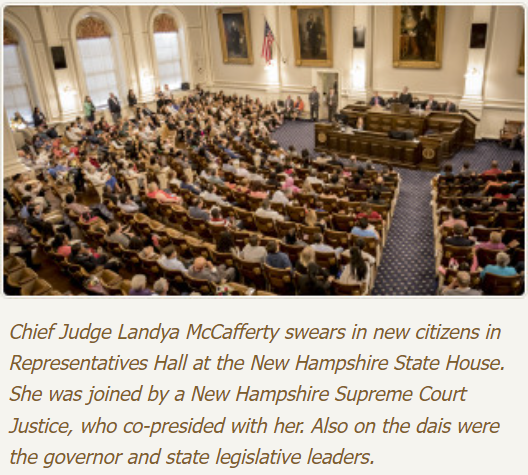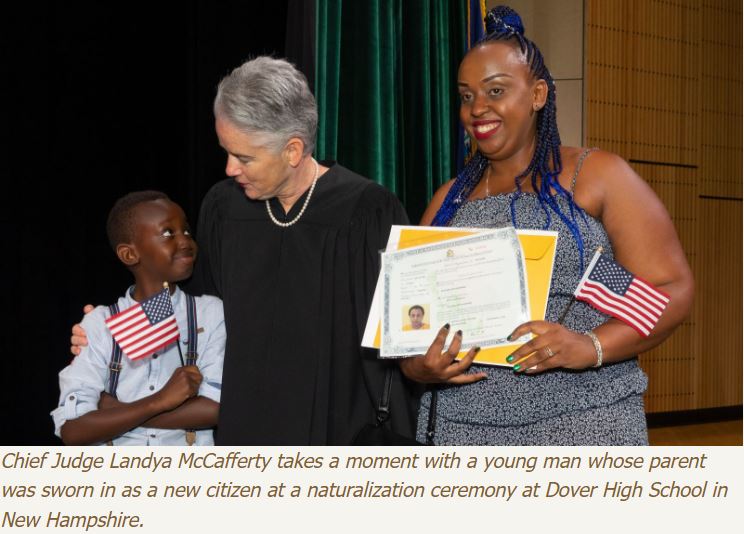Chief Judge Says Civics Education in the Courts is a Win-Win
 When Chief Justice John G. Roberts, Jr., called on judges to make civics education a priority in his 2019 year-end report on the federal Judiciary, he reminded his readers that “each generation has an obligation to pass on to the next, not only a fully functioning government responsive to the needs of the people, but the tools to understand and improve it.”
When Chief Justice John G. Roberts, Jr., called on judges to make civics education a priority in his 2019 year-end report on the federal Judiciary, he reminded his readers that “each generation has an obligation to pass on to the next, not only a fully functioning government responsive to the needs of the people, but the tools to understand and improve it.”
Chief Judge Landya McCafferty, of the District of New Hampshire, sees civics education not only as an obligation, but as a way to prepare the next generation of jurors, lawyers, judges, journalists, and engaged citizens who will interact with the courts.
“I am glad that our Chief Justice has made civics a priority in the federal Judiciary,” she said. “I think of civics outreach as a part of my job as a federal judge. While I find the time commitment for civics outreach a challenge, I always leave each session refreshed and inspired to do more. It is a win-win for the students, the community and the court.”
By making educational outreach a priority, McCafferty has created programs and efficiencies that have allowed her to reach hundreds of students every year in courtrooms, classrooms, and school auditoriums.
McCafferty got the civics momentum rolling in 2016 with monthly, scheduled courthouse visits that gave eighth graders the opportunity to observe a hearing, participate in a naturalization ceremony, talk with the judge, lawyers, and court staff, and discover role models and career paths in the court system. The program, which was paused due to COVID restrictions, is expected to resume in January.
“Students love doing mock trials and appellate arguments in an actual courtroom with a judge and lawyers supervising,” McCafferty said. “It is an opportunity for students to interact with the human face of the legal system and practice civil discourse and critical thinking in resolving conflicts.”
While McCafferty describes her programs as homegrown, she adds that the educational resources on USCourts.gov “can get a judge up and running in minutes.” The programs are courtroom- and classroom-ready. The time commitment for judges and volunteer attorneys is 30 minutes for reading through the materials and 15 minutes for an orientation meeting before entering the courtroom or classroom. Programs can range from 50 minutes to three hours.
As the outreach program evolved, McCafferty presided over naturalization ceremonies at high schools, and at the New Hampshire State House with the participation of elected state officials who appreciated the inter-branch comity. Over time, her repertoire grew to include simulated sentencing hearings on teen-relevant issues in her courtroom. Today, the “You Be the Judge” program is offered two or three times a month in a courtroom. Students are conscientious about wearing masks as they grapple with the complexities of sentencing someone convicted of a hypothetical crime.
Below is a summary of the primary initiatives in New Hampshire. McCafferty invites judges to reach out to her for more information.
OFFSITE NATURALIZATION CEREMONIES
Working with U.S. Citizenship and Immigration Services, the court brings naturalization ceremonies into local high schools so that young people can witness the appreciative reactions of people from around the world who are sworn in as new citizens. Students participate by leading the Pledge of Allegiance, giving musical performances, and reading a student-written welcome letter selected for the occasion in a school competition.

NATURALIZATION & CIVICS DAY
Naturalization & Civics Day is a daylong program for middle school students visiting the New Hampshire State House to interact with all three branches of government. For their judicial branch experience, students observe a naturalization ceremony, then work with law school students to prepare for and participate in appellate oral arguments. Students also participate as lawyers, judges, and jurors in a scripted mock trial. Between the hearings, probation officers conduct an anti-bullying program.
YOU BE THE JUDGE
Another way that high school students experience the role of the federal courts is by participating in a simulated sentencing hearing in a hypothetical criminal case. Students are organized into small groups of prosecutors and defense lawyers that are coached by attorney volunteers and probation staff. The student judges group works with the presiding judge to prepare and participate on the bench. The courtroom program concludes with students observing a sentencing hearing then debriefing afterward with the attorneys who argued the case.
VIRTUAL SCHOOL VISITS
During the pandemic, McCafferty made virtual visits to high school classrooms across the state to conduct versions of the courtroom programs. She was often joined by assistant federal public defenders, assistant U.S. attorneys, and other volunteers from the New Hampshire State Bar. Because of these positive experiences, the court welcomes requests for remote visits from schools that are too far away to offer a field trip to a courthouse.




